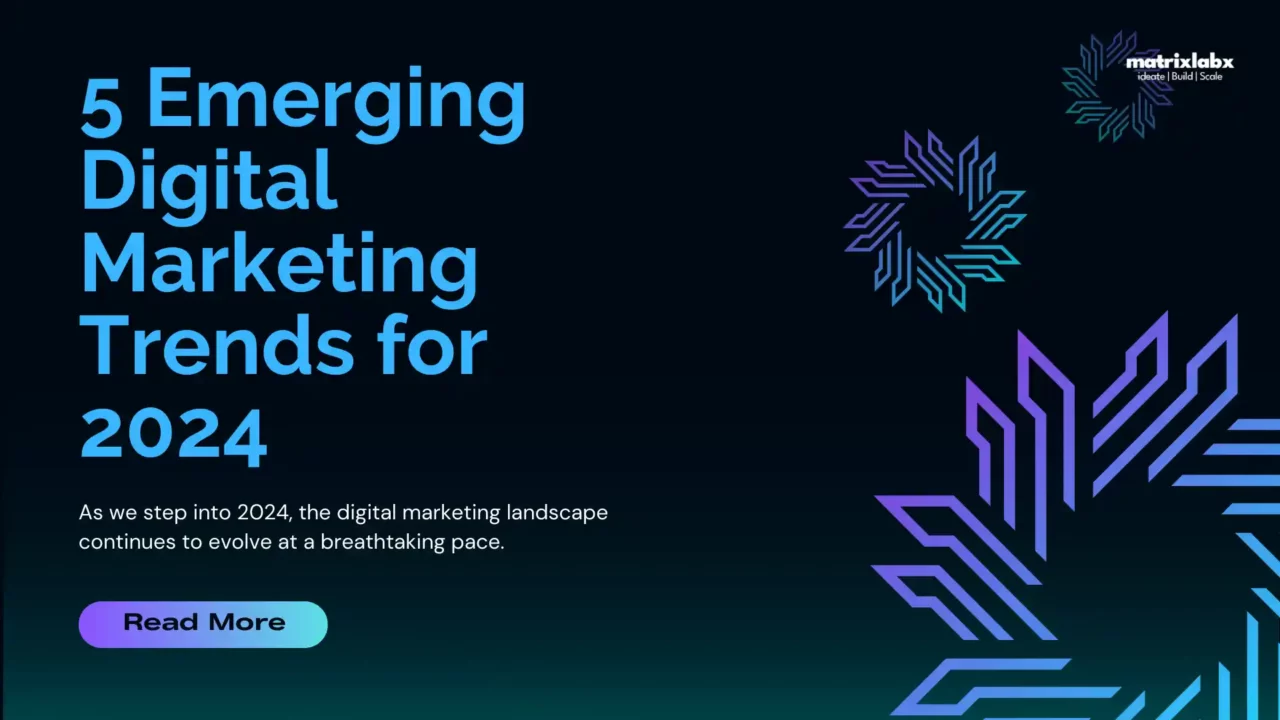5 Emerging Digital Marketing Trends for 2024
Learn about the 5 Emerging Digital Marketing Trends for 2024
As we step into 2024, the digital marketing landscape continues to evolve at a breathtaking pace. With emerging technologies and consumer behaviors shifting, businesses must stay ahead of the curve to maintain relevance and competitive edge.
This article delves into five key digital marketing trends shaping the future, focusing on innovative strategies, SEO for small businesses, and practical social media marketing tips.
1. Personalization at Scale

The Rise of AI-Driven Marketing
In 2024, personalization is no longer just a trend; it’s a necessity. Advanced AI algorithms enable marketers to create personalized content and experiences for individual consumers at scale.
This shift from a one-size-fits-all approach to a more tailored strategy enhances customer engagement and boosts brand loyalty.
Leveraging Data for Customized Experiences
Businesses are harnessing the power of big data to understand customer preferences better.
Marketers can predict future needs by analyzing past behavior and providing personalized recommendations, significantly enhancing the customer journey.
2. Voice and Visual Search Optimization
Adapting SEO for the Age of Voice Assistants
Optimizing for voice search is crucial with the increasing use of voice assistants. SEO strategies for small businesses must evolve to include conversational keywords and question-based queries that align with natural speech patterns.
The Emergence of Visual Search
Visual search technology allows users to search using images instead of words.
Brands that optimize their online content for visual search will gain a significant advantage, particularly in industries where visuals are key, such as fashion and home decor.
3. Interactive and Immersive Content

The Power of AR and VR in Marketing
Augmented Reality (AR) and Virtual Reality (VR) transform digital marketing by creating immersive and interactive experiences. These technologies offer innovative ways for brands to engage with consumers, from virtual try-ons to interactive 3D advertisements.
Harnessing the Power of AR and VR in Marketing 3D Products: A CPO’s Perspective
Seeking innovative ways to enhance user experience and drive product adoption. In today’s tech-driven world, Augmented Reality (AR) and Virtual Reality (VR) offer unparalleled potential to revolutionize how we market 3D products.
1. Immersive Product Visualization:
AR/VR technology allows users to visualize 3D products in their environment. Imagine a customer virtually placing a sofa in their living room, customizing its color and fabric, and experiencing its scale and presence firsthand. This immersive experience fosters deeper engagement and confidence in the product, leading to increased purchase intent.
2. Interactive Product Exploration:
AR/VR apps can unlock interactive features that enable users to explore 3D products in detail. Imagine a customer manipulating a car model in VR, inspecting its engine, and even taking it for a virtual test drive. This interactive learning experience increases product knowledge and builds trust, leading to higher conversion rates.
3. Personalized Product Configuration:
AR/VR allows for real-time customization of 3D products. Imagine a customer using an AR app to personalize a pair of sneakers, choosing from different colors and designs, and seeing the final product come to life.
This personalized experience fosters a stronger emotional connection with the product, increasing customer satisfaction and brand loyalty.
4. Enhanced Educational and Training Experiences:
AR/VR can be used to create interactive tutorials and training programs for products with complex features. Imagine technicians using VR simulations to learn how to repair complex machinery or surgeons practicing delicate procedures in a virtual environment.
These immersive experiences enhance learning outcomes and improve skill development, increasing productivity and efficiency.
5. Increased Brand Awareness and Engagement:
AR/VR technology can create interactive marketing campaigns that capture the user’s attention and create lasting impressions. Imagine brands using AR filters to allow users to try on clothing virtually or experience their products in real-world settings.
These interactive campaigns drive brand awareness, generate social media buzz, and increase brand engagement.

Unlocking the Potential of AR and VR:
AR and VR have the power to revolutionize the way we market and sell 3D products. By investing in these technologies and integrating them into our product strategy, we can create immersive and interactive experiences that engage and connect with our customers on a deeper level.
This will ultimately lead to increased brand awareness, product adoption, and long-term business success.
Looking ahead, the possibilities are endless. We are only at the beginning of a new era of product marketing, and I am excited to explore the potential of AR and VR to create even more powerful and engaging experiences for our customers.
Engaging Customers Through Gamification
Gamification in marketing involves incorporating game design elements into non-game contexts.
It’s an effective way to increase customer engagement and loyalty, making mundane tasks more enjoyable and rewarding.
4. Sustainability and Ethical Marketing
The Growing Demand for Brand Transparency
Consumers are increasingly valuing sustainability and ethics in their purchasing decisions. Brands that demonstrate a genuine commitment to environmental and social responsibility will earn consumer trust and loyalty.
Integrating Sustainability into Digital Marketing
Digital marketing strategies must reflect a brand’s commitment to sustainability. This involves messaging and ensuring that digital practices, like data storage and energy consumption, are eco-friendly.
5. Social Media Marketing: Beyond the Basics
Leveraging New Social Media Platforms
The social media landscape is constantly evolving, with new platforms emerging regularly. Brands must identify and leverage these platforms early to reach new audiences and stay relevant.
Advanced Social Media Marketing Tips
Effective social media marketing in 2024 goes beyond regular posts and ads. It includes strategies like social listening, influencer collaborations, and leveraging user-generated content to build a community around the brand.
SEO for Small Businesses: Adapting to the Changing Landscape
Understanding the Importance of Local SEO
For small businesses, local SEO is more important than ever.
Optimizing for local search helps businesses become more visible to consumers in their immediate geographic area, driving foot traffic and local online sales.
The Role of Content in SEO
Content remains king in SEO.
Producing high-quality, relevant, and engaging content boosts a website’s search engine ranking and helps establish the business as a thought leader.
The Crucial Role of Content in SEO: A CMO’s Perspective
The ever-evolving landscape of digital marketing, where SEO reigns supreme.
And within SEO, content is the kingmaker, the foundation upon which success is built. Here’s why:
1. Content Attracts and Engages Users:
High-quality content acts as a magnet, attracting users searching for information or solutions.
Whether it’s informative blog posts, engaging videos, or captivating infographics, valuable content keeps visitors glued to your website, increasing dwell time and boosting engagement.
Search engines note this, recognizing your website as a relevant and authoritative source, ultimately rewarding you with higher rankings.
2. Content Answers User Queries:
The heart of SEO lies in understanding user intent and delivering content that satisfies their search queries. By strategically incorporating relevant keywords and structuring your content logically, you ensure search engines understand the context and purpose of your pages. This makes your website easily discoverable, ensuring you reach the right audience with your message.
3. Content Builds Credibility and Trust:
In today’s digital age, authenticity and expertise are paramount. You build trust with your target audience by consistently producing high-quality content demonstrating your knowledge and understanding of your field.
This translates into brand loyalty and increased conversions, ultimately driving business growth.
4. Content Generates Backlinks:
Creating link-worthy content is the holy grail of SEO. When other websites link back to yours, it signals to search engines that your content is valuable and trustworthy.
This boosts your website’s authority and domain ranking, propelling you further up the search results ladder.
5. Content Enables Multi-Channel Marketing:
Content is the versatile tool that fuels your entire marketing strategy. It can be repurposed and distributed across various channels, from social media and email marketing to paid advertising campaigns.
This integrated approach amplifies your reach and maximizes the ROI of your content creation efforts.
Are Your Marketing Efforts a Shot in the Dark? Let’s Turn on the Spotlight!
Imagine having the clarity of seeing your marketing strategy from a bird’ s-eye view and understanding every nuance of your campaigns. Our comprehensive audit delves into the core of your marketing DNA, dissecting each campaign with surgical precision to identify the powerhouse strategies and weed out the underperformers.

Investing in Content is Investing in Growth:
Creating a solid content strategy is not just a passing trend but a long-term investment yielding exponential returns.
By prioritizing high-quality content, you ensure your website stands out online, attracts qualified leads, and ultimately achieves business goals.
The power of content and its undeniable impact on SEO success. Let’s focus on creating content that resonates, educates, inspires, and watches our brands flourish in the ever-competitive digital landscape.
Embracing the Future of Digital Marketing
The digital marketing landscape in 2024 is dynamic and multifaceted. Businesses can stay ahead of the curve by embracing these emerging trends – from AI-driven personalization to ethical marketing, immersive experiences, and innovative social media strategies.
As we navigate this ever-changing digital world, the key to success lies in flexibility, innovation, and a deep understanding of consumer needs and behaviors.

